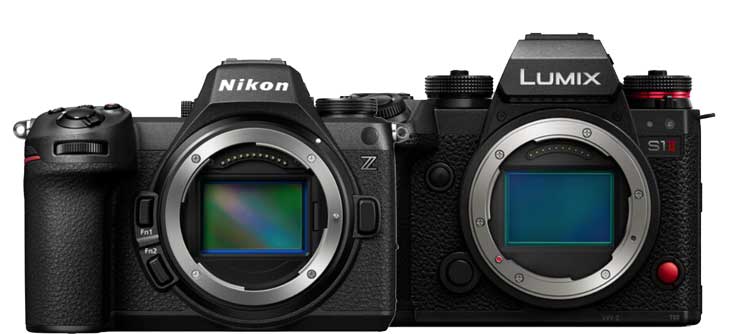
Which one is the Best Camera for Recording Video – Panasonic Lumix S1 II vs. Nikon Z6 III? this the the most asked question in my DM and mailbox from the day of the announcement of the Panasonic S1 II camera. I wish I had a one-size-fits-all all answer, but there just isn’t one…
Why Panasonic S1 II better, and what about the Nikon Z6 III?
Panasonic Lumix DC-S1 II’s video capabilities “surpass” the Nikon Z6III in its broader range of video features, such as Open Gate recording (6K/30p, 5.1K/60p) and as we all know that the open gate recording is not available in the Nikon Z6 III camera., extensive monitoring tools (vectorscope, anamorphic lens support and in camera desqueez), although we all know that now Nikon has also included waveform support, timecode in their camera but some specical features that may fall under the “must have” list of a PRO cinematographer may be absent in the Z6 III. So, it actually at the end depend on users what they want from the camera and the budget boundaries are.
and let’s explore the 4 K high frame rate mode, in the 4K/120p with a smaller crop (1.17x vs. Z6III’s APS-C). However, there are some features that only the Nikon Z6 III has at this moment, the Z6III can record 6K/60p in N-Raw, which the S1II cannot, as its 6K is limited to 30fps and internal NRAW, which is about to arrive in S1 II in paid firmware update section. The S1II’s strengths lie in its creative flexibility and toolset, but the Z6III’s 6K/60p capability gives it an edge for high-frame-rate, high-resolution video.
| Feature / Spec | Panasonic Lumix DC-S1II | Nikon Z6III |
| Price | $3197 – B&H Store | $2096 – B&H Store |
| 6K Recording | 6K/30p (Open Gate), 5.9K/60p (16:9), 5.1K/60p (Open Gate) | 6K/60p (N-Raw) |
| High-Frame-Rate Video | 4K/120p with 1.17x crop | 4K/120p with APS-C crop (~1.5x) |
| Rolling Shutter Performance | ~12.8ms | ~9.4ms (better for fast motion) |
| Recording Formats | ProRes, ProRes RAW, internal 10-bit | N-Raw, ProRes RAW (via external) |
| Internal fan | Yes | No |
| Monitoring Tools | Vectorscope, waveform, anamorphic desqueeze, LUTs, timecode |
Waveform and timecode available (No vectorscope or anamorphic tools) |
| Audio Features |
24 Bit standard Audio input 32-bit float audio support with XLR |
Standard audio support no XLR option |
| Creative Flexibility | High (Open Gate, multiple aspect ratios, pro tools) | Moderate (focus on resolution and frame rate) |
| Crop at 4K/120p | 1.17x | APS-C crop (~1.5x) |
| Overall Advantage | Better for filmmakers, flexible workflows | Superior for 6K/60p high-res, high-speed video |
When buying a camera for filmmaking or wedding cinematography, here’s an oversimplified way to look at it:
See, we have three major factors supporting the Panasonic S1 II camera, and here they are: Open Gate modes, advanced monitoring tools, and a less severe crop at 4K/120p, which provide creative flexibility for PRO filmmakers. However, I don’t overlook the Z6III’s ability to record 6K/60p in N-Raw, a significant advantage for users needing high-resolution, high-frame-rate video without cropping. The S1II’s 6K is capped at 30fps, and while it offers 5.9K/60p and 5.1K/60p, these don’t directly match the Z6III’s 6K/60p capability. The Z6III’s edge in 6K/60p while noting the S1II’s strengths in other areas, ensuring accuracy and relevance.
Follow us on our social pages FACEBOOK | TWITTER | INSTAGRAM, to get LIVE News and Panasonic Rumor






